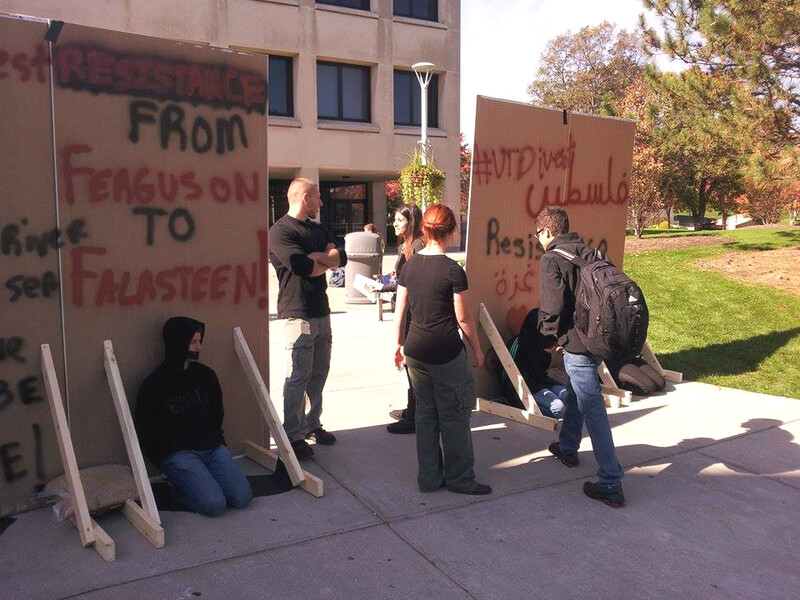Activism and BDS Beat 17 February 2015

University of Toledo’s Students for Justice in Palestine constructed a mock version of Israel’s wall in the West Bank and campaigned for divestment last October. (UT-SJP Facebook page)
At the Unviersity of Toledo in Ohio tonight, student activists will argue in favor of a resolution to divest from US companies profiting from Israeli violations of Palestinian rights.
But the university administration is mandating that they must do so in a “closed meeting,” preventing both the resolution’s supporters, opposition and the general public from hearing presentations to the student government.
The resolution voting process will also be done by secret ballot, meaning that the student body won’t be able to know how their representatives voted on the resolution.
Derek Ide, a student at the University of Toledo and the co-founder of the campus chapter of Students for Justice in Palestine (UT-SJP), told The Electronic Intifada that the decision to close the hearing and force secret balloting “harms transparency and democracy.”
In recent months, students collected hundreds of signatures on campus supporting the resolution.
Students have identified the University of Toledo’s investments in Cemex, Rolls-Royce, General Electric and Hewlett-Packard, which contribute to or profit from Israel’s violations of Palestinians’ rights.
Ignoring alliances
The local Toledo Blade reports that the on-campus chapter of Hillel, a nationwide network of campus centers for Jewish students which opposes boycott and sanctions efforts, ”characterized the proposed action as an attempt to ‘isolate and delegitimize Israel.’”
Ide said that Hillel brought in the Jewish Federation of Toledo to lead the campaign to derail the divestment resolution. The group is affiliated with a national network called the Jewish Federations of North America (JFNA). In 2010, JFNA and the Jewish Council for Public Affairs launched the “Israel Action Network,” described as “a multimillion-dollar joint initiative to combat anti-Israel boycott, divestment and sanctions campaigns” and to fight “the delegitimizing of the State of Israel.”
Earlier this week, the student government announced that two of the five speakers against the divestment resolution would be non-student representatives of the Jewish Federation of Toledo. But by this morning, Ide told The Electronic Intifada it was decided that non-students will not be able to engage in the “open floor” presentations.
By only allowing five representatives each from UT-SJP and Hillel to speak at the closed hearing, Ide said that the administration has implied that divestment is a religious conflict instead of a human rights issue. “They present[ed] an image of two equal and opposing viewpoints,” Ide said, ignoring SJP’s alliance with a diverse array of students and campus groups.
In a letter sent Monday to UT-SJP, Hillel and members of the Jewish Federation, seen by The Electronic Intifada, student body president Clayton Notestine states that the student government and the administration decided to limit the meeting to avoid “increasing the chances for violent protest, talking over speakers, and putting stress on an already contentious issue.”
This morning, UT-SJP posted on Facebook: “Today is the day for social justice to flourish at our university. Despite the obstacles set in our way by administration, by student government, and by outside interference, we still feel confident that our divestment resolution will win a majority of votes in Student Government. In order to help ensure this happens, we need you to be present TONIGHT!”





